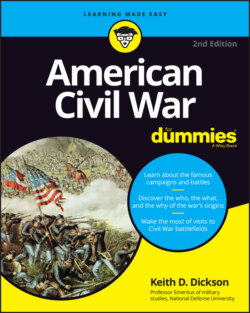Читать книгу American Civil War For Dummies - Keith D. Dickson - Страница 83
DOUBLEDAY UP TO BAT
ОглавлениеCaptain Abner Doubleday, second in command at Fort Sumter, aimed and gave the command to fire the first Union cannon shot of the Civil War. Although he became a major general, commanding a division, Doubleday’s name is more associated with baseball rather than the Civil War. Doubleday was believed to be the inventor of baseball in Cooperstown, New York, in 1839, a claim now discounted.
But Lincoln’s call for the 75,000 troops changed minds quickly and dramatically. It was one thing to debate whether the Constitution was a compact of voluntary association or an insoluble bond, but it was quite another thing for the federal government to use force against the states to enforce its will. None of these states would allow troops to be sent against fellow Southerners. Thus, when Lincoln declared the states in rebellion and intended to use coercive military force, the states of the upper South issued their own ordinances of secession. But these were different. There was no mention of slavery; instead, they asserted their rights as sovereign states to leave the Union voluntarily.
To top it off, Maryland, Missouri, and Kentucky, all slaveholding states, threatened to leave the Union as well. A large and powerful group of angry people now confronted the U.S. government. Lincoln suddenly found himself with double the problem that he had before the fall of Fort Sumter.
The bloodless battle that opened the war unleashed the torrent of long-held pent-up emotions. In both the North and the South, people laughed, cried, danced, sang, and prayed for joy at finally reaching a resolution to the tensions. Young men from all over America ran eagerly to join volunteer units forming up to fight. The excitement of adventure and glory was almost overwhelming. The North responded to Lincoln’s call for 75,000 men with over 100,000 volunteers.
